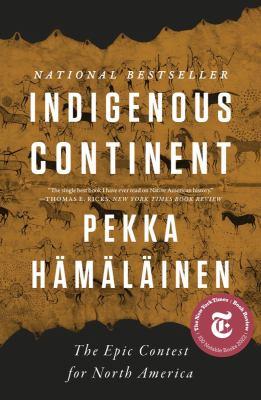
Indigenous continent : the epic contest for North America
This nation's history and self-understanding have long depended on the notion of a "colonial America," an epoch that supposedly laid the foundation for the modern United States. In Indigenous Continent, Pekka Hämäläinen overturns the traditional, Eurocentric narrative, demonstrating that, far from being weak and helpless "victims" of European colonialism, Indigenous peoples controlled North America well into the 19th century. From the Iroquois and Pueblos to the Lakotas and Comanches, Native empires frequently decimated white newcomers in battle, forcing them to accept and even adopt Native ways. Even as the white population skyrocketed and colonists' land greed become ever more extravagant, Indigenous peoples flourished due to sophisticated diplomacy and flexible leadership structures. As Hämäläinen ultimately contends, instead of "colonial America" we should speak of an "Indigenous America" that was only slowly and unevenly becoming colonial. In our myth-busting era, this restoration of Native Americans to their rightful place at the very center of American history will be seen as one of the most important correctives yet.
Available Copies by Location
| Location | |
|---|---|
| Community Centre | Available |
Browse Related Items
- ISBN: 9781631496998
-
Physical Description
print
xiv, 571 pages : illustrations, maps ; 25 cm - Edition First edition.
- Publisher [Place of publication not identified] : [publisher not identified], 2022.
Content descriptions
| Bibliography, etc. Note: | Includes bibliographical references and index. |
| Formatted Contents Note: | The dawn of the indigenous continent -- Appear at a distance like giants -- The contest for the great American interior -- The indigenous backlash -- The enduring indigenous continent -- The heart of the continent -- American revolutions -- The age of equestrin empires. |
Additional Information

Summary
Indigenous Continent : The Epic Contest for North America
There is an old, deeply rooted story about America that goes like this: Columbus "discovers" a strange continent and brings back tales of untold riches. The European empires rush over, eager to stake out as much of this astonishing "New World" as possible. Though Indigenous peoples fight back, they cannot stop the onslaught. White imperialists are destined to rule the continent, and history is an irreversible march toward Indigenous destruction. Yet as with other long-accepted origin stories, this one, too, turns out to be based in myth and distortion. In Indigenous Continent, acclaimed historian Pekka Hämäläinen presents a sweeping counternarrative that shatters the most basic assumptions about American history. Shifting our perspective away from Jamestown, Plymouth Rock, the Revolution, and other well-trodden episodes on the conventional timeline, he depicts a sovereign world of Native nations whose members, far from helpless victims of colonial violence, dominated the continent for centuries after the first European arrivals. From the Iroquois in the Northeast to the Comanches on the Plains, and from the Pueblos in the Southwest to the Cherokees in the Southeast, Native nations frequently decimated white newcomers in battle. Even as the white population exploded and colonists' land greed grew more extravagant, Indigenous peoples flourished due to sophisticated diplomacy and leadership structures. By 1776, various colonial powers claimed nearly all of the continent, but Indigenous peoples still controlled it-as Hämäläinen points out, the maps in modern textbooks that paint much of North America in neat, color-coded blocks confuse outlandish imperial boasts for actual holdings. In fact, Native power peaked in the late nineteenth century, with the Lakota victory in 1876 at Little Big Horn, which was not an American blunder, but an all-too-expected outcome. Hämäläinen ultimately contends that the very notion of "colonial America" is misleading, and that we should speak instead of an "Indigenous America" that was only slowly and unevenly becoming colonial. The evidence of Indigenous defiance is apparent today in the hundreds of Native nations that still dot the United States and Canada. Necessary reading for anyone who cares about America's past, present, and future, Indigenous Continent restores Native peoples to their rightful place at the very fulcrum of American history.


